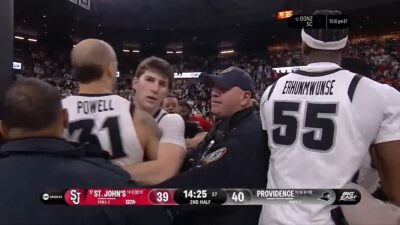Did the Jacksonville Jaguars commit a Rooney Rule violation in their attempt to hire Liam Coen as their new head coach? That’s how one report is making it seem.
Reports on Thursday had said that the Jaguars were hiring Coen as their coach. However, there was secrecy surrounding the development.
The Tampa Bay Buccaneers were said to have been attempting to get a hold of Coen so that he could sign a deal with them to remain their offensive coordinator. The team struggled to get into contact with him on Thursday, while the Jags kept quiet about their dealings with him. Now one report has shed some light regarding the circumstances.
According to a story published by SI’s Albert Breer on Friday, the Jags and Coen kept things quiet for two reasons.
One, the Buccaneers’ offer to make Coen the highest-paid coordinator in the NFL at $3 million per season was contingent upon him not interviewing a second time with the Jags. Had word gotten out that Coen had a second interview with Jacksonville on Thursday, the offer from Tampa Bay would have been nullified.
Two, and here’s where it gets interesting: according to Breer’s report, the Jags were trying to keep things quiet so they could satisfy the Rooney Rule.
The report says that the Jags had not yet satisfied the Rooney Rule prior to Thursday. So they supposedly kept things quiet regarding Coen in order to interview Las Vegas Raiders defensive coordinator Patrick Graham, who is black. Graham needed to interview in-person on Thursday for the rule, which is aimed at giving minority candidates a shot at jobs, to be satisfied. Once the in-person interview with Graham was completed, the Jags could then move forward with Coen as they wanted.
The end result is that the in-person with Graham was a sham since the Jags had every intent of hiring Coen.
Both Graham and the NFL should look into the matter, as wasting someone’s time like that does very little good for the parties involved.














